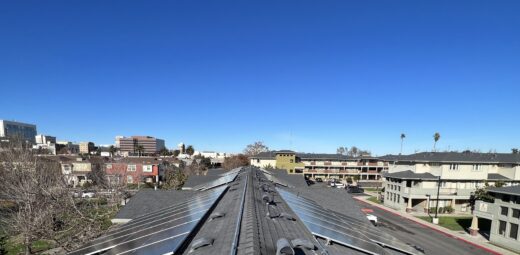
Apr 12Sustainability Projects Reduce the Energy Burden of Low-Income Households
Mercy Housing’s Sustainability Team strives to reduce the environmental impacts on our communities through various projects that enhance energy and water efficiency, and by installing rooftop solar panels. We are proud to highlight the national impact these projects have on reducing energy and carbon consumption across Mercy Housing’s communities, but there is another impact worth acknowledging; the direct impact these installations and retrofits have on Mercy Housing residents. Mercy Housing’s sustainability programs often benefit the people who call Mercy Housing home by reducing their utility costs. Nationally, low-income households spend a larger portion of their income on energy costs for electricity and natural gas compared to other households (U.S. Department of Energy). This is often referred to as a household’s energy burden.
Sacrificing Necessities to Pay Bills
According to a 2023 report by the American Council for an Energy-Efficient Economy (ACEEE), those who experience energy burdens often sacrifice necessities many take for granted – including food, healthcare, and transportation – to pay their utility bills and to avoid losing power. They are more likely to keep their homes at unsafe temperatures or use unsafe methods, like ovens, to heat their homes. This results in disproportionate health and safety challenges. People experiencing energy burdens are also more likely to have their utilities shut off which can result in their food and medicine spoiling (ACEE, 2023). It is estimated that over four million utility shutoffs occurred between January and October 2022 alone, and more than one in four households in the United States struggled to meet their energy needs in 2020 (Goodson Bell et al. 2023; EIA 2022 as cited in ACEE, 2023).

Rooftop Solar Projects Decrease Utility Bills
Mercy Housing’s recent rooftop solar projects in California directly decrease residents’ utility bills and help provide energy security. We are partnering with Sunrun to develop 1,266 kW of PV rooftop solar arrays at 9 communities and Grid Alternatives to develop 98.4 kW at a community in California courtesy of the SOMAH program. This unique partnership provides clean power and an average electricity bill credit of $36/unit each month to these communities. This credit will help offset the average $52 monthly increase by their utility, PG&E, since January 2021 (Matters, 2023). Utility prices have not been immune to the inflation rates experienced in the last few years and while we cannot control grocery prices, Mercy Housing is proud to help reduce utility costs and reduce financial stress for residents. California’s residential electricity prices are already more than twice the national average, according to the report by the Public Advocates Office (Matters 2023). Over the next 20 years, the tenants at the 10 communities will continue to reap benefits from the arrays and collectively save an estimated $5 million in energy costs.
Expanding Solar Outreach to Residents
For properties without rooftop solar, Mercy Housing is working to expand community solar outreach to residents and reduce their utility costs. At Decatur Place in Denver, we partnered with Energy Outreach Colorado to enroll 25 households into community solar subscriptions which will decrease monthly electricity bills by roughly 50%. Low-income and multifamily residents traditionally have less opportunity to take advantage of the benefits of solar. One of Mercy Housing’s Core Values is justice, and we are happy to do our part to bridge this gap and make renewable energy’s benefits and cost savings accessible to residents.
Upgrades Reduce Costs and Improve Conditions
Following a pause of in-unit energy and water efficiency upgrades due to the Covid 19 pandemic, Mercy Housing reinstated work in units while adhering to local health and safety guidelines. Since 2022, nearly 1,200 households where residents are responsible for paying at least one utility bill, have received energy or water efficiency upgrades including insulation, Energy Star appliances, smart thermostats, LED lightbulbs, and low-flow faucets and showerheads. Cost-effective efficiency improvements in low-income households can reduce electricity consumption by 13% to 31%, and insulation upgrades improve indoor air quality, resulting in healthier environments that can decrease residents’ sick days and hospital visits (U.S. Department of Energy). Part of the sustainability team’s mission is to create healthier living conditions and reduce expenses for all Mercy Housing residents while encouraging them to practice energy and water conservation habits daily to get the greatest benefit and largest financial savings possible. We are proud to retrofit their homes with quality conservation upgrades that can also reduce their utility costs and improve their health and safety conditions.

Looking Forward
Mercy Housing looks forward to continuing our work with program partners to reduce costs for residents. Offsetting utility costs through solar energy and unit upgrades is a start but does not fully address the negative impacts of utility shutoffs and costs on low-income households. While these solutions are important in bridging inequities, comprehensive solutions are needed nationwide to address the energy burden gap fully. National, state, and local governments and utility companies need to implement intentional policies that systemically address energy affordability and prevent costly shutoffs. For example, eliminating barriers like challenging applications, language accessibility, and upfront costs of upgrades for low-income customers (ACEE, 2023). In the interim, Mercy Housing’s Sustainability Team continues with initiatives that reduce energy costs for residents and coalesce our organization-wide sustainability goals to further enhance living standards in our communities.
No related posts.
Stay Up To Date
Get news on Mercy Housing and inspiring stories of change delivered to your inbox.


